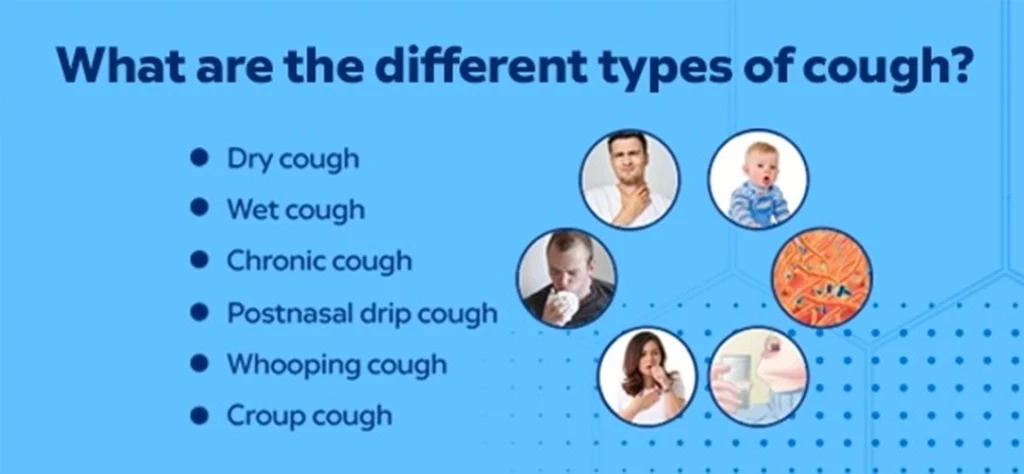A cough Causes is a common symptom that can happen for many reasons, from a simple cold to more serious conditions. Understanding its causes, how it’s diagnosed, and the available treatments can help you find relief. In this article, we’ll explore what might be behind your cough and how to manage it effectively.
What is a cough Causes?
A cough is your body’s way of clearing out irritants from your throat and lungs. It’s a natural reflex that helps protect and heal your body.
What are the types of cough Causes?
There are different types of coughs. Some names tell you how long they last, while others describe how they feel or sound. Some coughs are also linked to specific health conditions.
Types of coughs may be related to how long they last
An acute cough Causes starts suddenly and lasts for about two to three weeks.
A subacute cough sticks around after an infection and lasts for three to eight weeks.
A chronic cough causes lasts longer than eight weeks and is sometimes called a persistent cough.
A refractory cough is a long-lasting cough that doesn’t get better with treatment.
Types of coughs may be related to mucus
A productive cough, also called a wet cough, brings up mucus or phlegm.
A non-productive cough, or dry cough, doesn’t bring up any mucus or phlegm.
Types of coughs that have distinct sounds and are related to specific conditions
Whooping: Pertussis, or whooping cough, is an infection that causes a cough with a “whoop” sound.
Barking: A cough that sounds like barking may be a sign of croup.
Wheezing: This type of cough happens when your airways are blocked. It can be linked to an infection like a cold or long-term conditions like asthma.

Types of coughs related to when you cough
Daytime cough: A cough that happens during the day.
Nighttime (nocturnal) cough: A cough that occurs at night.
Cough with vomiting: This is common in children, where coughing so hard can cause gagging or vomiting.
Who is more likely to experience a cough Causes?
Anyone can get a cough, and it’s one of the most common reasons people visit doctors.
However, some people are more likely to get a cough. These include those who:
- Smoke tobacco or marijuana
- Vape
- Have long-term illnesses, especially related to the lungs or nervous system
- Have allergies
- Are children, since they get sick more often, especially if they’re in daycare or school
What are the most common causes of a cough Causes?
Many things can make you cough, such as:
- Smoke
- Strong smells (like cleaners or perfumes)
- Mold
- Dust
- Pollen
- Pet hair
- Mucus
- Certain medicines, like those for high blood pressure
Medical conditions that can cause chronic cough Causes
Conditions that can cause a cough include:
- Chronic bronchitis
- Asthma
- Allergies
- COPD and other lung problems
- GERD (acid reflux)
- Throat issues, like vocal cord problems
- Postnasal drip
- Heart failure and other heart conditions
What can be done to control or relieve a cough Causes?
How you treat a cough depends on what’s causing it. If your cough is due to an infection, your doctor may give you antibiotics or antiviral medicine, but most viral coughs don’t need antivirals. For GERD (acid reflux), your doctor might suggest changes to your diet or prescribe medication to lower stomach acid.
If you’re looking for more information on managing a cough, check out resources like digitalpakistani for helpful tips and advice.
Drinking water can help soothe a cough by easing throat irritation. You can also use a vaporizer or take a steamy shower to add moisture to the air, which can help.
Quitting smoking and avoiding things that irritate your throat, like strong smells, smoke, or allergens, can also help relieve a cough.
What over-the-counter treatments can I use for cough Causes?
There are many cough syrups and medicines for adults that you can buy without a prescription, but they often don’t work better than a simple spoonful of honey. Cough drops and hard candies, like butterscotch, can help calm your throat. Hot drinks like tea with honey can also offer relief.
If your child is under 6, avoid giving them cough medicine unless your doctor says it’s okay.
For more tips on dealing with a cough, visit digitalpakistani for helpful advice.
How can cough Causes be prevented?
You can prevent some coughs by avoiding things that trigger them.
To prevent coughs from infections, try these tips:
- Get vaccinated for flu, COVID-19, and pneumonia.
- Stay away from people who are sick.
- Avoid touching your eyes, nose, and mouth.
- Wash your hands often with soap and water, or use hand sanitizer.
When should you call your doctor about a cough?
If you or your child have a chronic condition, it’s a good idea to call your doctor for advice.
In general, contact your doctor if your cough won’t go away and you have any of these symptoms:
- Wheezing (a whistling sound when breathing out)
- Fever over 101.5°F or a fever lasting more than a day or two
- Chills
- Phlegm that’s thick, yellow, green, or bloody
Go to the emergency room or call 911 if you have a cough and:
- Feel like you’re choking
- Can’t breathe well
- Cough up a lot of blood
- Have severe chest pain
How do I know if my cough is serious?
To figure out what’s causing your cough, your doctor will ask about your medical history, do a physical exam, and may run some tests. They’ll check important things like your temperature and breathing rate. If your cough lasts a while, they might check your oxygen levels, perform a breathing test, or even take a chest X-ray.
For more tips on understanding and treating a cough, visit digitalpakistani for helpful advice.
Your doctor may ask:
- If you smoke, use marijuana, or vape
- What kind of work you do
- How long you’ve been coughing
- How well you breathe when resting or being active
- If your cough is keeping you from sleeping
- If you cough up anything, like phlegm or blood
- What medications do you take
- If you have a bad taste in your mouth or bad breath that won’t go away
- If you have face pain or unintentional weight loss
Can pregnancy make you cough Causes?
Pregnancy doesn’t usually cause a cough, but changes in your immune system might make you more likely to catch a cold or cough. And, the cough may last longer than usual.
Contact your doctor if your cough lasts longer than expected or if you’re having trouble eating, sleeping, or breathing.

What does it mean if I cough after eating?
If you cough after eating, it might be because food or drink went down the wrong way, meaning it went toward your lungs instead of your stomach. Normally, our body protects us from this by keeping food out of our lungs. When this happens, coughing helps clear it, and it’s usually not a serious issue. However, if food or drink does get into your lungs, it’s called aspiration. This can happen if you have trouble swallowing or other health issues with your digestive or lung system. If you often cough after eating, let your doctor know.
What should I know about COVID-19 and cough?
A cough is a symptom of COVID-19 and can also be part of a post-COVID syndrome (or long COVID).
With long COVID, a cough can last weeks or months after you’ve recovered from the virus. You may also feel very tired, have trouble concentrating or remembering things, and/or have difficulty breathing.
If you haven’t been tested for COVID-19 yet, contact your doctor. If you’ve already been diagnosed, follow your doctor’s advice for managing ongoing symptoms.
A note from Cleveland Clinic:
Coughing usually isn’t serious. It’s normal for your body to clear things from your throat and airways. If you also have other symptoms like trouble breathing, fever, trouble eating or sleeping, or coughing up blood or colored mucus, call your doctor. For young children who can’t tell you how they feel, it’s best to call your child’s doctor if they have a cough with a fever or if it sounds concerning.
